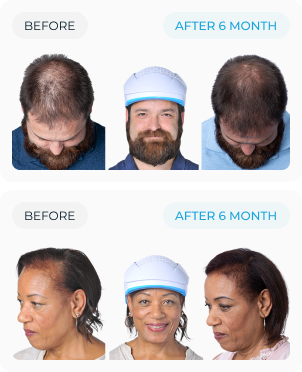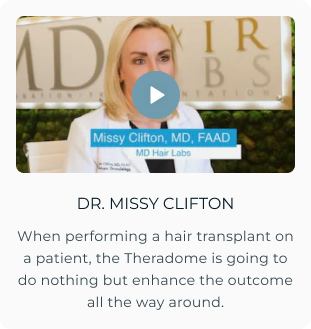We all know that sleep is essential for our overall well-being, but did you know that lack of sleep can also lead to hair loss? That’s right—sleep deprivation can contribute to thinning hair. Sleep is more than just rest; it’s crucial for our health, impacting various bodily functions, including the condition of our hair.
The sleep cycle consists of several phases, including rapid eye movement (REM) and non-REM stages. These phases are key to helping our bodies repair, regenerate, and recover. Deep sleep, in particular, has a part in the release of growth hormones, which are essential for hair growth and overall bodily functions.
The link between sleep and hair loss highlights the importance of quality sleep for healthy hair. In this article, we’ll explore how sleep deprivation can lead to hair loss, and how the duration and quality of our sleep can directly impact the health and appearance of our hair.
The Role of Sleep in Hair Health
Sleep is an important time for the body’s repair and regeneration, including the rejuvenation of hair follicles. Disruptions to the sleep cycle can interfere with these processes, disrupting the hair growth cycle and contributing to hair loss.
Cell Repair and Growth: During sleep, the body goes through various repair processes, including cell regeneration. Hair follicles, which are responsible for hair growth, are also rejuvenated during sleep. Therefore, sleep deprivation can cause hair loss by hampering the crucial cell repair and growth processes that keep our hair strong and vibrant.
Hormone Regulation: Sleep helps in regulating hormone levels. Hormones like cortisol, melatonin, and growth hormones, which are associated with stress, sleep, and growth, respectively, can impact hair health. Disrupted sleep can lead to hormonal imbalances, potentially affecting hair growth and strength.
Blood Circulation: Proper blood circulation is crucial for delivering nutrients and oxygen to hair follicles. Sleep deprivation can affect circulation, potentially leading to poor hair health and even hair loss.
Stress Reduction: Poor sleep can increase stress levels, which can contribute to conditions like telogen effluvium, where hair prematurely enters the resting phase and falls out. Managing stress through adequate sleep can help maintain healthy hair growth.
Find out more about stress-induced hair loss.
Inflammation Reduction: Sleep deprivation may contribute to inflammation in the body. Chronic inflammation can negatively impact hair follicles, affecting hair loss or thinning.
How Does Lack of Sleep Cause Hair Loss?
Lack of sleep can directly contribute to hair loss in several ways. Let’s take a closer look:
1. Insufficient Nutrient Delivery
While you sleep, your body undergoes essential processes, which include the delivery of nutrients, oxygen, and hormones to your hair follicles. Without enough sleep, this nutrient supply is compromised, weakening hair follicles and leading to hair loss.
2. Increased Stress Levels
Insufficient sleep increases stress levels, which can contribute to conditions like telogen effluvium, when hair prematurely enters the resting phase and falls out.
3. Disrupted Hormonal Balance
Sleep plays a key role in maintaining a healthy hormonal balance. When you don’t get enough rest, this balance can be thrown off, disrupting the hair growth cycle and causing thinning or shedding.
4. Weakened Immune System
Insufficient sleep weakens the immune system, leaving you more vulnerable to health issues, including scalp inflammation, dandruff, and other conditions that can contribute to hair loss.
5. Reduced Circulation
Sleep deprivation can impair blood circulation, including the flow of oxygen and nutrients to your scalp. Proper circulation is crucial for healthy hair follicles, and poor circulation can lead to weakened follicles and hinder hair growth.
Tips for Improving Sleep and Hair Health

Improving your sleep is vital not only for overall well-being but also for healthy hair. Here are some tips to help you get better rest and boost hair health:
1. Consistent sleep schedule: Going to bed and waking up at the same time every day can significantly improve your sleep quality and hair health. A regular sleep routine helps regulate your body’s internal clock, making it easier to fall asleep and wake up naturally.
2. Establish a bedtime routine: Create a calming pre-sleep routine to signal to your body that it's time to wind down. This could include reading, taking a warm bath, or practicing relaxation techniques like deep breathing or meditation.
3. Limit screen time before bed: The blue light from phones, tablets, and computers can interfere with your body’s melatonin production, which is essential for sleep. Aim to avoid screens at least an hour before bedtime to help your body prepare for rest.
4. Create a sleep-friendly environment: Make your bedroom conducive to sleep by keeping it dark, quiet, and cool. Consider blackout curtains, earplugs, or a white noise machine to minimize distractions.
5. Watch your diet: Be mindful of what you eat and drink before bed. Avoid heavy meals, caffeine, and alcohol, as they can disrupt your sleep and impact sleep quality.
6. Exercise regularly: Regular physical activity promotes better sleep, but try to avoid vigorous exercise right before bed, as it can make falling asleep more difficult.
7. Manage stress: Stress and anxiety can significantly impact sleep quality. Practice relaxation techniques or try activities like yoga or mindfulness meditation to help manage stress.
8. Limit naps: If you're struggling with poor sleep at night, keep daytime naps short (20-30 minutes) or avoid them altogether to ensure they don’t interfere with your nighttime rest.
Read More: 7 Tips for Sexy Hair Growth
Nutrition and Sleep for Hair Health
"Getting the right nutrition and enough sleep is essential for healthy hair. When you don’t sleep well, your body can become stressed, which might lead to hair loss. Eating a balanced diet with plenty of vitamins and minerals can help support hair growth and reduce hair loss. Foods rich in vitamins like B12, D, and iron are especially good for your hair.
Lack of sleep can cause hormonal imbalances that affect hair growth. When you’re sleep-deprived, your body produces more stress hormones, which can lead to hair thinning and loss. By ensuring you get enough sleep and eat a nutritious diet, you can help maintain healthy hair and reduce the risk of hair loss caused by sleep deprivation."
Get to know more in detail on role of nutrition in hair growth.
Managing Stress for Better Sleep and Hair

Effective stress management techniques, including meditation, yoga, mindfulness practices, regular exercise, and hobbies that promote relaxation, play a crucial role in improving both sleep quality and hair health. Chronic stress can disrupt the hair growth cycle, leading to hair loss or thinning. Therefore, managing stress levels is paramount for maintaining healthy hair.
Reducing stress and improving sleep can indirectly benefit hair health. Lower stress levels can prevent conditions like telogen effluvium, where stress triggers hair follicles to enter the resting phase and shed prematurely. Additionally, better sleep supports overall cell regeneration, including the rejuvenation of hair follicles, promoting healthier hair growth.
Incorporating stress management techniques and enough sleep hygiene practices can positively impact your sleep quality and hair health. If stress or sleep issues persist and significantly affect your well-being, you should seek professional help from a therapist or healthcare provider.
Is Hair Loss from Lack of Sleep Reversible?
Yes, by improving your sleep habits and addressing the root causes of sleep deprivation, hair loss related to poor sleep can often be reversed. Prioritize sufficient sleep, stress management, a balanced diet, and caring for your overall health to support hair regrowth.
However, if the hair loss is due to other factors, such as genetics, hormonal changes, or medical conditions, additional treatments or interventions may be needed to fully reverse the effects of sleep deprivation on hair health.
How Theradome Can Help With Hair Growth
The link between sleep deprivation and hair loss emphasizes the importance of prioritizing quality sleep for overall health, including maintaining healthy hair. That said, if your hair loss is unrelated to sleep issues, an alternative solution could be necessary.
Theradome offers a technology-driven approach to hair restoration and combating hair loss. Using clinically proven low-level laser therapy technology, Theradome stimulates hair follicles to promote healthier hair growth. The device emits laser light that penetrates the scalp, reaching the hair follicles to enhance cellular activity and improve blood circulation. This stimulation revitalizes the follicles, resulting in thicker, fuller, and healthier hair over time.
While Theradome doesn’t directly address sleep-related issues, it is an effective solution for those experiencing hair loss linked to disrupted sleep patterns.
























